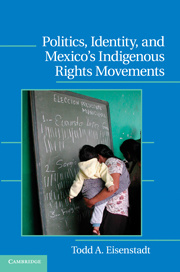Todd A. Eisenstadt is Associate Professor of Government at the American University, where he also serves as chair of the department. He is the author of Courting Democracy in Mexico (Cambridge University Press, 2004) and has published dozens of articles and book chapters and co-authored or edited several books on democratization, identity and social movements, public opinion, political parties and electoral campaigns, mainly in Latin America. Professor Eisenstadt has been a visiting scholar at Harvard University's David Rockefeller Center for Latin American Studies, the Centro de Investigación y Docencia Económicas (CIDE) and El Colegio de México in Mexico City, the Latin American Social Science Faculty (FLACSO) in Quito, Ecuador and the Center for US-Mexican Studies of the University of California, San Diego. Research for this book was funded in part by the United States Agency for International Development (USAID) and an American University Faculty Development grant. His work has also been funded by the Fulbright Commission, the National Security Education Program, the International Rotary Foundation and the Ford Foundation, among others.




